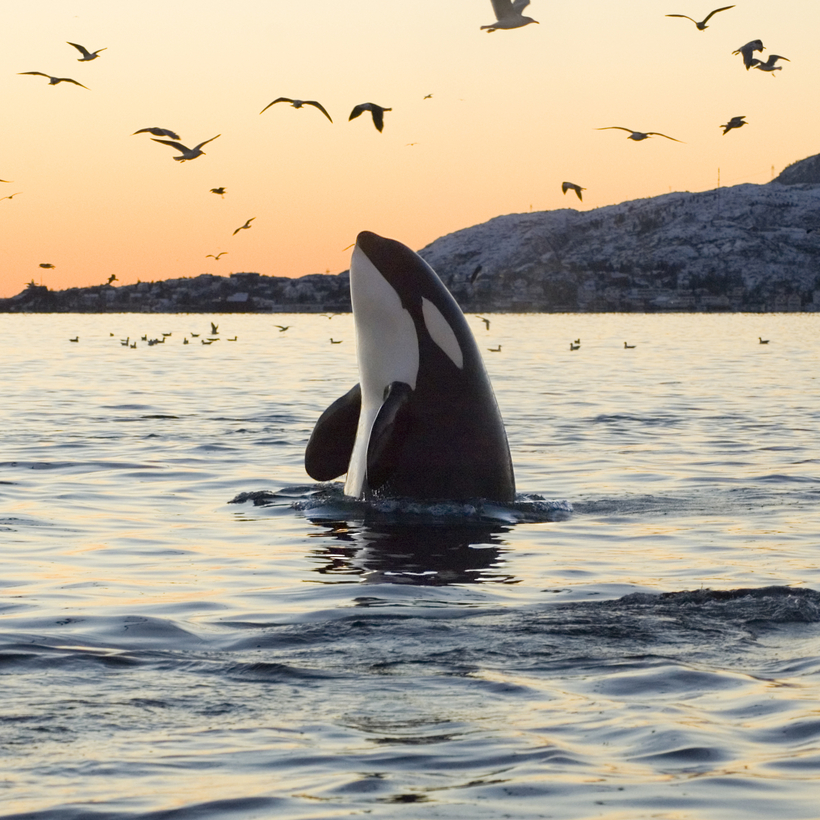Humans have long considered themselves nature’s great benefactors. We feed ducks in the park, toss scraps to alley cats and leave out bowls of kibble for the neighborhood hedgehog. We give, they take.
That, at least, is how the story usually goes. But could one of the world’s most intelligent predators be turning the tables?
A study has reported 34 examples of wild orcas apparently presenting humans with gifts of food. The behavior, documented in six different populations from Norway to New Zealand, appeared to be deliberate and often followed a consistent pattern. The animals, also known as killer whales, were seen approaching people who were in boats, in the water or even standing on shore.

The orcas brought fish, bits of whale, birds, stingrays, seaweed and in one case a turtle. After letting go of these morsels, they almost always hovered, seemingly waiting to see what the humans would make of the offering.
In a few brave instances, the food was picked up, inspected, then politely tossed back — prompting the whales to retrieve and return it.
The observations, described in the Journal of Comparative Psychology, are intriguing. Examples of animals voluntarily provisioning humans are not uncommon in folklore. Ancient Rome had the story of Romulus and Remus being suckled at the teat of a she-wolf; in Asia there are myths of lost children being raised by monkeys. But scientifically documented cases have been rare and limited to just a couple of species, such as leopard seals bringing divers freshly killed penguins.
The scientists behind the study, who combined their own experiences in the field with eyewitness interviews, stress that the orcas’ motivations are unknown — and quite possibly unknowable. However, they have come up with several theories.
One is that this is an example of “interspecific generalised altruism” — in other words, that the orcas are extending a flipper of friendship, without expecting anything in return.
The researchers admitted they could not rule out a darker, “Machiavellian” explanation. “We do not know the end goal of the cases reported here or even if there were any, but captive killer whales have been known to use dead prey to attract other species and then kill, but not always eat them,” the team, who were led by Jared Towers of the California Killer Whale Project, wrote in their study.
So far, however, there has been no hint of ill intent towards people — only orcas offering their kills and humans almost always politely declining.
Unlike their captive cousins, which have occasionally attacked trainers, wild orcas have never been known to kill humans. Even so, caution is advised: these animals are, after all, inventive apex predators and their “capacity to display complex and varied behaviours” remains poorly understood, the researchers add.
Perhaps the most plausible theory is that their food-sharing is a natural outgrowth of the orcas’ innate curiosity. “This behaviour may represent some of the first accounts of any wild predator intentionally using prey and other items to directly explore human behaviour,” Towers and his colleagues wrote.
The consistency of their own behavior might support that. In 33 of the 34 cases, the gift-bearing orca seemed to wait for a response. Yet, as they puzzle over the significance of these mysterious and oddly polite gestures, the researchers concede that something deeper may be at work — that perhaps we are seeing a glimmer of interspecies rapport.
Offering items to humans, they conclude, “could simultaneously include opportunities for killer whales to practice learned cultural behaviour, explore, or play and in so doing learn about, manipulate, or develop relationships with us”.
Rhys Blakely is the science correspondent at The Times of London

